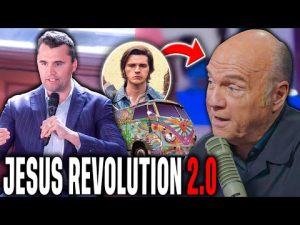**The Shaky Economic Landscape: A TikTok Debate Among Friends**
In a world where social media brings people together, one conservative commentator found solace in TikTok, a platform he believes is a cornerstone for community building. He reminisced about the virtual space where math teachers simplify complex concepts and gardeners share their green-thumb secrets, highlighting how these interactions form a real community based on respect and shared values. However, the conversation quickly shifted from wholesome musings on online community to the unnerving state of the economy and inflation—a topic that sparks heated debate in any setting.
The phrase “immaculate disinflation” was floated in the discussion, suggesting that inflation rates were supposed to be decreasing. But, as any grocery shopper might argue while staring at exorbitant egg prices, reality paints a different picture. It appears that the old adage of “just go to the grocery store” could serve as a guide to understanding today’s runaway inflation. Price tags on everyday items reveal the bitter truth: despite some prices falling in specific categories, the overall cost of living continues to spiral out of control.
The commentator pointed out the history of tuition rates, arguing that college education costs are skyrocketing, making it almost impossible for younger generations to invest in their futures. While inflation has its ebbs and flows, the stubborn reality is that living expenses have never been higher, leaving many to ponder the viability of homeownership and financial independence. With millennials and Gen Z facing unprecedented challenges, the commentator lamented that young people are left to grapple with an economic landscape that would make their parents’ financial hurdles seem like a cakewalk.
A fascinating aspect of the discussion centered around the role of government and its fiscal policies. The commentator expressed discontent over the soaring national debt, suggesting that borrowing trillions is not just fiscally irresponsible but morally reprehensible, as future generations bear the weight of such burdens. In a world of political finger-pointing, comparisons were drawn between the actions during the Trump administration and today’s economic crisis, emphasizing that the path taken then sets the stage for today’s sobering consequences.
The dialogue took a turn as they tackled the controversial subject of private equity firms buying up homes and the resulting impact on housing markets. This practice has led to a rental culture that many deem detrimental to society. With private capital snapping up single-family homes, the dream of homeownership feels increasingly out of reach for young adults. The commentator argued that the influx of cheap money post-pandemic has weakened the currency, making it more difficult for the average American.
The conversation ended on a somewhat uneasy note, with reflections on whether such borrowing strategies were a necessary evil to recover from the pandemic-induced recession. Apparently, many felt that shutting down the economy was not the right course of action, and these post-pandemic scars are still fresh and painful. As one could expect, the views expressed captured the depth of political and economic frustration that seems to permeate today’s discourse. The participants left the event with their beliefs intact, nodding in agreement that something needs to change and soon.
In this ever-evolving economic landscape, the intersection of social media discourse and serious topics like inflation and homeownership creates a unique atmosphere. TikTok may seem like an unlikely stage for discussing economic woes, yet the platform’s ability to foster community and debate remains undeniable. While it’s hard to predict the future of this conversation—or the economy itself—what is certain is that the issues at hand are critical, affecting everyday lives in profound ways.







